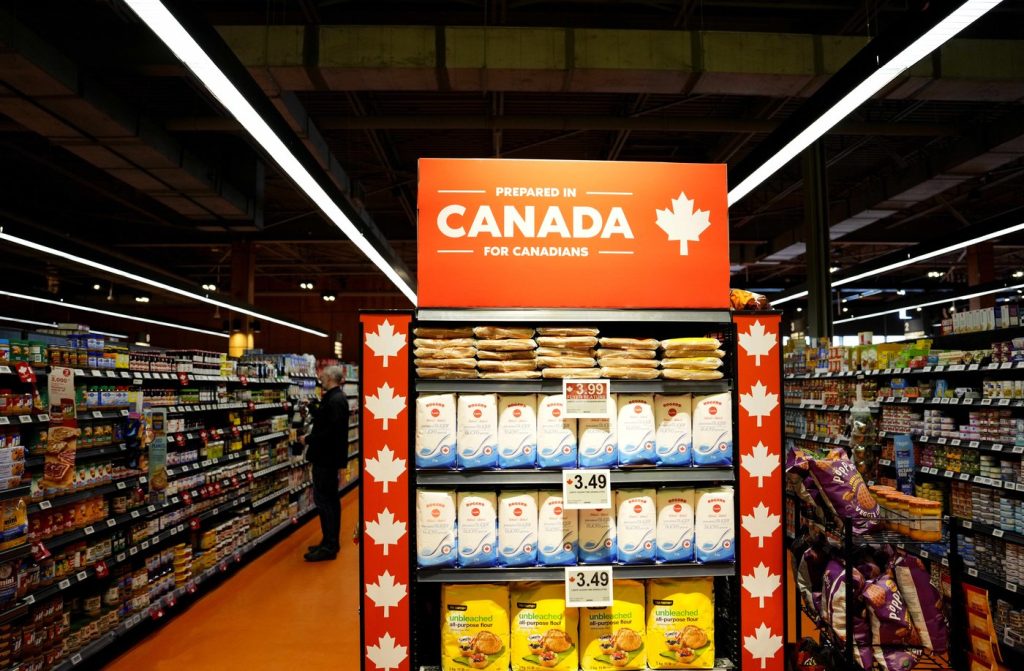Relief on the way for baby formula shortage in Canada

Posted May 18, 2022 5:53 pm.
Last Updated May 18, 2022 6:42 pm.
An ongoing baby formula shortage has some parents panicking about how to feed their infants and the lack of stock, preferred brands or type of formula in grocery stores has left them scrambling for a solution.
Shereen Mohiuddin’s eight-month-old daughter Maya requires ready-to-feed formula and says finding enough stock of her preferred brand is a constant source of stress.
“There are other alternatives that we are not looking to present our daughter with because we don’t want to play with her gut health,” she explained. “So dealing with the anxiety is not fun. I’m not breastfeeding and knowing that my child solely relies on formula is very discouraging, very anxiety provoking, because I am going through my own postpartum journey as well.”
Mohiuddin says she sees empty or poorly stocked shelves at her local grocery store and travelling to various different stores in other neighbourhoods is not an easy option. She’s relying on online retailers to have formula shipped to her home.
“It can get expensive, it can get hectic. I feel bad for other moms who are also just like me exclusively relying on formula and not able to breastfeed,” she said.
What is causing the shortage?
The Retail Council of Canada tells CityNews the recent recall by U.S. manufacturer Abbott — involving brands Similac, Alimentum and EleCare — has impacted supply in Canada, but to a lesser degree than in the U.S. Canadian grocery retailers have their own private label formula and that has softened the blow to some extent.
However, Abbott’s Michigan factory was shut down in February after four illnesses were reported in babies who had consumed powdered formula from its Michigan plant. The closure is a big part of the problem, contributing to wider and ongoing pandemic-related issues dating back to mid-2021.
“The global supply chain challenge that we have all been living with for the past couple of years is also contributing. There is a shortage of some of the raw ingredients that goes into baby formula. An example could be sunflower oil — especially for those more specialized formulas, that has definitely been an issue,” said Michelle Wasylyshen, national spokeswoman for the Retail Council of Canada.
Wasylyshen says the supply of sunflower oil has been impacted by the Russian invasion of Ukraine, as Ukraine is one of the world’s largest producers of the ingredient.
She adds that other brands are also experiencing shortages due to increased demand as parents look for alternatives in the absence of Abbott products.
Different retailers use different supply chains, so the impact of the shortage can vary greatly between them and from province to province.
Ontario’s Ministry of Agriculture, Food and Rural Affairs says the shortage in the province is not dire.
“In Ontario, infant formula continues to be available to fulfill customer requirements, even though the availability of some brands may be limited. We continue to monitor the availability of infant formula in the province,” said spokeswoman Belinda Sutton in a statement.
In other parts of Canada, there have been recent reports of customers clearing out shelves entirely when they see their preferred product in stock, further exacerbating the issue.
“Panic buying is never helpful. We saw that at the beginning of the pandemic with toilet paper. So we’re asking customers to be mindful that — this is an important product and there really needs to be enough everyone. I know that’s a difficult message when it comes to baby formula, but that’s the situation right now,” said Wasylyshen. “We are seeing that some of our retailers are placing buying limits. So when customers go into the store they may only be able to buy a certain number of products and that’s to make sure that there are enough for everyone.”
What is being done to combat the shortage?
Wasylyshen says there are several retailers who have not been heavily impacted by the shortage and says many have been working since February to acquire a sufficient supply of baby formula across multiple brands and formats.
To provide further relief, the Retail Council of Canada has also been working with Health Canada on a temporary solution.
“[Health Canada] has just recently approved an interim policy for certain products to be sold into Canada from other countries. And those countries are other states within the United States, the U.K., Ireland and Germany,” she said.
More than 20 products have been approved and will be subject to the same safety controls that Health Canada conducts for all products, assured Wasylyshen.
“The only difference might be [for example] labeling requirements. In Canada, our product labels are required to be in both French and English. The reason why these products might not typically be on our shelves often has to do with labeling considerations,” she said.
On Wednesday, U.S. President Joe Biden invoked the Defense Production Act to speed production of infant formula and authorized flights to import supply from overseas. The Defense Production Act order requires suppliers of formula manufacturers to fulfill those orders before other customers.
On Monday, Abbott also reached an agreement with U.S. health officials to restart production, saying they will prioritize specialized formulas that don’t have a lot of comparable substitutes available. Even so, it will take some time before supply is replenished.
“Once the Abbot facility does get back up and running, it does still take some time to get those products produced onto the shelves. So we still are looking at potentially a six to eight week kind of lag,” said Wasylyshen.
With files from The Canadian Press








